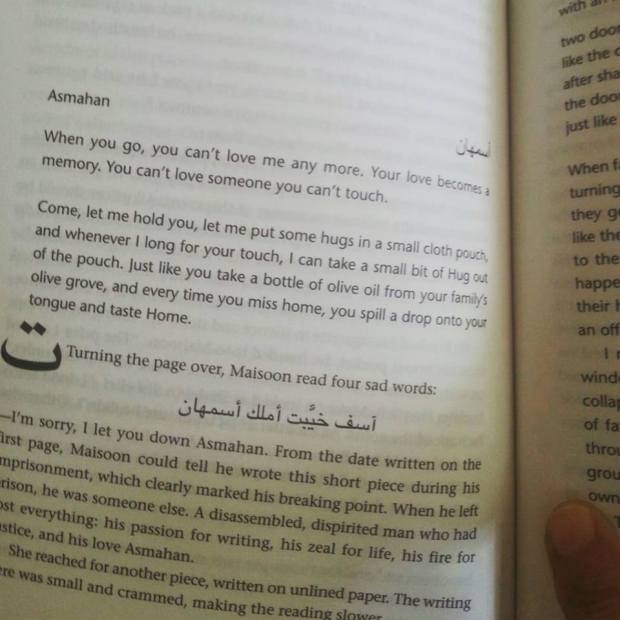As a Palestinian woman who lives between four languages and several cultures, I write in different languages, each time according to the context. Sometimes my choice of language in social media is arbitrary, while at other times it depends on the content and context.
As an activist in the fight against sexual violence in the Palestinian society, and the co-founder of the Tuskuteesh Facebook page (don’t remain silent) – a safe space for Arab women to share testimonies of sexual violence, I use the Arabic language in this context. Sometimes I write about the issue in Hebrew (and English), as the Arab-Jewish partnership is important to me and I understand that many of my Jewish friends still do not know Arabic, so I make efforts to make some texts accessible to them, according to need.
A couple of days ago, I was searching for children’s books in Arabic on the theme of sexual violence for a new corner on Tuskuteesh, and I wrote a short status in Arabic, which I then copied and pasted to various Facebook pages. In one of the pages, “Feminist Discourse,” I was shocked at some of the comments the post received: “You decided to take over here as well?” “What’s this fucked up thing of writing in Arabic?” or, “You’re just looking for attention.” Another comment referred to the fact that I was using a “foreign language.”
The thought that in a group that defines itself as “Feminist Discourse” it was so important for women who define themselves as feminists, and as women who are interested in the intersections between various layers of oppressions and power relations, to silence the non-ruling language and to ignore the contents a Palestinian woman posted – was no less than shocking to me. This attack naturally led me to leave the group immediately, but the feelings of pain and shock haven’t left me since.
I am left wondering about this phenomenon of fear of the Arabic language in Israel and of every language that is not Hebrew or English. I ask myself what leads the hegemony to fear other languages so much in the public sphere? In this context, how does a Facebook post, written in a language that some members in the group cannot understand, undermine to such an extent the sense of exclusivity, control, certainty, and security? Sadly, and regardless of the incident on Facebook, this is a common and widespread phenomenon in Israel. A few months ago, I stood in line to the cashier at the local supermarket, and the woman in front of me was talking to the cashier in Russian. Another woman started screaming: “You’re in Israel. We speak Hebrew here.”
Needless to say, generations of non-Jews have lived in this place. The fact that we speak Arabic should not threaten anyone in any way, nor plant fear in anyone. This fear of the Arabic language – of its very presence – is completely unjustified. The Arabic language is an official language in the state of Israel; more than 20% of the population speaks Arabic. I have the full right to speak, read, write, and dream in this language, just as every individual has the full right to speak, read, write, and dream in her/his language.
The comment that referred to the fact that the Arabic language is a “foreign language” pained me in a deep sense. Arabic is a local, native language, it is the language of all of our neighbouring countries. How did it become a “foreign language”? Years of sowing fear and of incitement against a whole population; years of intentional deletion of the Arabic language from public spaces, and attempts at silencing the language in work places where most employees speak Arabic. The example I brought is a reflection of a much broader reality.
The symbolic deletion of the Arabic language constitutes an ugly embodiment of not wanting to see us, to cancel our existence in the public sphere, and to establish a state of all its Jews. Needless to say that this wish is also reflected in real and much more violent events. But somehow, this silencing in the virtual space, whereby its sole purpose was to say: get out of my sight, you and your language, take your curly letters and just disappear – can be just as disturbing. All I have left to say to those women who commented on my Arabic status and who call themselves feminists is: we are not going anywhere. On the contrary, Arabic is part of your cultural landscape, even if you refuse to admit it. Or, as Maya Angelou writes: “You may shoot me with your words, You may cut me with your eyes, You may kill me with your hatefulness, But still, like air, I’ll rise.”
p.s. What I didn’t include in the original article in Hebrew, originally published in Haoketz (with the Arabic translation), is the fact that my novel, Haifa Fragments, includes in it scattered words and sentences in Arabic. In her review of the novel in The Independent, Lucy Popescu writes: “Haifa Fragments is written in English and Khamis repeatedly uses Arabic or Hebrew words when they are unnecessary.” It was maybe unnecessary for the reviewer, maybe it jammed the flow of the text for her, but for me, it was an act of a political statement; to give presence to the Arabic language when it is being systematically deleted from every public sphere.



I replied to your e-mail hope it reaches you! My internet was dodgy (kept going down)!
LikeLike
I am supportive of what you said …
LikeLiked by 1 person
Tried to comment but my internet connection is intermittent and refuses to connect with you (I think it is my end, not yours – I am in our ‘summerhouse’ down the garden, where the signal does this sometimes , not in our study in the house).
I sense your outrage and I agree: while fighting discrimination re women, etc, they should also be aware and supportive to a nation (whatever nation) which is oppressed. The whole situation is very regrettable, very bad. Nowadays, it could happen here (UK) I fear, as Muslims are being targeted by fearful, nationalist people due to the IS terrorism. In your ocuntryit looks like people are even more fearful – and of many other nations … So sorry the world is like this today … ntionalism seems to have raised its head in some horrible, retrograde, ways.
Clare/Mari >
LikeLiked by 2 people
As a Sociolinguist, a diaspora Jew of Palestinian descent (my forefathers were in Jerusalem till the early 19th century), I sympathize in more levels than I could ever express. The fact that the Israeli society has become so impermeable to multilingualism and refuses to acknowledge the milenary presence of Arabic on its own territory makes me wonder more often than not about the future of such a society. Don’t hesitate to contact me or write about your experience. I will try as much as I can to spread spread your double combat against violence towards women and against linguistic intolerance. It anyhow always boils down to the question of a lack of education!
LikeLiked by 2 people
thank you for the kind words and support. Yes, it is sad… and you are right, it all boils down to education. I hope that the Israeli society will realize that the Arabic language should be taught in schools alongside the Hebrew, and on the same level.
LikeLiked by 2 people
I live in Switzerland and can testify that forcing a language on part of its population isn’t easy (here francophone kids hate learning German…and vice versa though to a lesser extent) and they usually end up speaking English together…. The new lingua franca of a Kountry already multilingual! So when I speak of education and although as a linguist I wish it were linguist education, I really mean educating people in respecting each other, in knowing their history and what it means to make the other people suffer because you’re arrogant and ignorant….
LikeLiked by 1 person
So glad to see another supporter, and one whose background is in Palestine. Yes all this is indeed based in lack of education – as is our nationalistic troubles … kids need to know the history and the sociology of where they live and who they are and who others are …and not in a biased way. How, I don’t know. So many kids are not interested in learning. Another problem is that increasingly opinions are based on emotions and feelings, not on objective thought, reason, and knowledge.
LikeLiked by 2 people
The internal problem of learning to learn and learning to think out-of-the-box…
LikeLike
A very thoughtful piece. well done Khoukha
Samar
LikeLike
i appreciated the Arabic references….and learned some new words. Knowing other languages increases deeply one’s understanding of life and cultures.
LikeLike